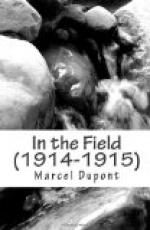VI. A TRAGIC NIGHT IN THE TRENCHES
November 3, 1914.
Imagine a little tiled room, some 16 feet by 9, in which for over a fortnight passing soldiers have been living, sleeping, and eating; imagine the furniture overturned, the broken crockery strewn on the floor, the doors and drawers of the cupboards pulled out, their modest contents scattered to the four corners of the house; add to this windows without glass, doors broken in, rubbish of every kind lying about, brought no one can tell whence or how; and yet note that one or two chromo-lithographs, a few photographs of friends and relatives and certain familiar objects, still cling to the walls, evoking the life that animated this home but a short time ago, and you will get some idea of the place where my Major, my comrades of the squadron and I were lodged on that memorable November evening.
It was five o’clock, and night was already falling, the cold, damp, misty night of Flanders following on a dreary autumn day. Outside the guns were roaring far away. The Battle of the Yser was going on.
Our regiment had just been brought by rail from the Reims district, where it was, to the North of France, and thence to Belgium. Our chiefs had said: “You must leave your horses, you must forget that you ever were cavalrymen, you must make up your minds cheerfully to your new calling and become infantrymen for the time being. We are short of infantry here, and the Germans are trying to rush Dunkirk and Calais. Your country relies upon you to stop them.” Our good Chasseurs left their horses at Elverdinghe, 10 kilometres from here. They came on foot, hampered by their heavy cavalry cloaks, dragging their riding boots through the atrocious mud of the ruined roads, carrying in their packs, together with their ration of bread and tinned meat, the huge load of one hundred and twenty cartridges; they arrived here in the firing line, and quite simply, as if they had never been accustomed to anything else, did wonders there and then.
Yesterday, I grieve to say, I was not at the head of my troop. I was unable to take part in the epic battle round Bixschoote, the poor Belgian village which was retaken and then abandoned by us for the twentieth time. I was not present at the heroic death of the gallant and charming Colonel d’A., of the —— Chasseurs, the author of those heart-stirring pages—and among them “The Charge”—which bring tears to the eyes of every cavalryman. He died facing the enemy, leading his regiment to the attack under terrific fire, and when his men carried him away they ranged themselves round him to make a rampart of their bodies for the chief they adored. I was not able to share the danger of my young comrade, Second-Lieutenant J., who fell bravely at the head of his marksmen, in the middle of my beloved regiment, in which fresh gaps have been made by the enemy’s bullets. My seniority had marked me out as officer of liaison to the General commanding our division. But this morning at dawn I came back to take my place in the firing line, and I think I shall be able to make up for lost time.




